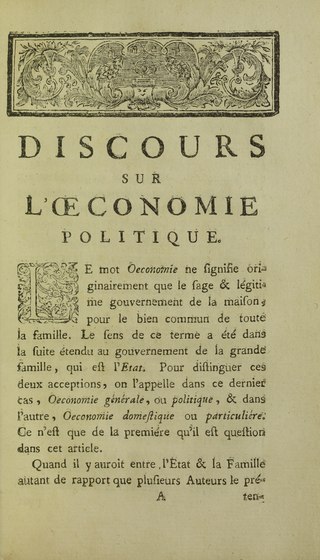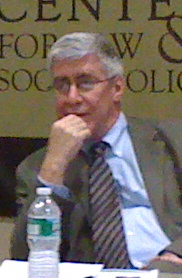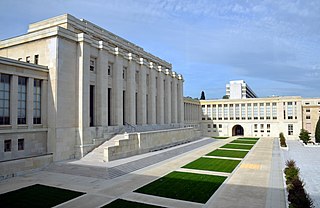Political science is the scientific study of politics. It is a social science dealing with systems of governance and power, and the analysis of political activities, political institutions, political thought and behavior, and associated constitutions and laws.

Political economy is a branch of political science and economics studying economic systems and their governance by political systems. Widely studied phenomena within the discipline are systems such as labour markets and financial markets, as well as phenomena such as growth, distribution, inequality, and trade, and how these are shaped by institutions, laws, and government policy. Originating in the 16th century, it is the precursor to the modern discipline of economics. Political economy in its modern form is considered an interdisciplinary field, drawing on theory from both political science and modern economics.

John Bordley Rawls was an American moral, legal and political philosopher in the liberal tradition. Rawls received both the Schock Prize for Logic and Philosophy and the National Humanities Medal in 1999. The latter was presented by President Bill Clinton in recognition of how his works "revived the disciplines of political and ethical philosophy with his argument that a society in which the most fortunate help the least fortunate is not only a moral society but a logical one".
Critical legal studies (CLS) is a school of critical theory that developed in the United States during the 1970s. CLS adherents claim that laws are devised to maintain the status quo of society and thereby codify its biases against marginalized groups.

Law and economics, or economic analysis of law, is the application of microeconomic theory to the analysis of law, which emerged primarily from scholars of the Chicago school of economics. Economic concepts are used to explain the effects of laws, to assess which legal rules are economically efficient, and to predict which legal rules will be promulgated. There are two major branches of law and economics; one based on the application of the methods and theories of neoclassical economics to the positive and normative analysis of the law, and a second branch which focuses on an institutional analysis of law and legal institutions, with a broader focus on economic, political, and social outcomes, and overlapping with analyses of the institutions of politics and governance.

In political science, voter turnout is the participation rate of a given election. This is typically either the percentage of registered voters, eligible voters, or all voting-age people. According to Stanford University political scientists Adam Bonica and Michael McFaul, there is a consensus among political scientists that "democracies perform better when more people vote."

Francis Ysidro Edgeworth was an Anglo-Irish philosopher and political economist who made significant contributions to the methods of statistics during the 1880s. From 1891 onward, he was appointed the founding editor of The Economic Journal.
Feminist legal theory, also known as feminist jurisprudence, is based on the belief that the law has been fundamental in women's historical subordination. Feminist jurisprudence the philosophy of law is based on the political, economic, and social inequality of the sexes and feminist legal theory is the encompassment of law and theory connected.The project of feminist legal theory is twofold. First, feminist jurisprudence seeks to explain ways in which the law played a role in women's former subordinate status. Feminist legal theory was directly created to recognize and combat the legal system built primarily by the and for male intentions, often forgetting important components and experiences women and marginalized communities face. The law perpetuates a male valued system at the expense of female values. Through making sure all people have access to participate in legal systems as professionals to combating cases in constitutional and discriminatory law, feminist legal theory is utilized for it all.

Jeremy Waldron is a New Zealand professor of law and philosophy. He holds a University Professorship at the New York University School of Law, is affiliated with the New York University Department of Philosophy, and was formerly the Chichele Professor of Social and Political Theory at All Souls College, Oxford University. Waldron also holds an adjunct professorship at Victoria University of Wellington. Waldron is regarded as one of the world's leading legal and political philosophers.

Anti-discrimination law or non-discrimination law refers to legislation designed to prevent discrimination against particular groups of people; these groups are often referred to as protected groups or protected classes. Anti-discrimination laws vary by jurisdiction with regard to the types of discrimination that are prohibited, and also the groups that are protected by that legislation. Commonly, these types of legislation are designed to prevent discrimination in employment, housing, education, and other areas of social life, such as public accommodations. Anti-discrimination law may include protections for groups based on sex, age, race, ethnicity, nationality, disability, mental illness or ability, sexual orientation, gender, gender identity/expression, sex characteristics, religion, creed, or individual political opinions.

Critical race theory (CRT) is a cross-disciplinary examination – by social and civil-rights scholars and activists – of how laws, social and political movements, and media shape, and are shaped by, social conceptions of race and ethnicity. The word critical in the name is an academic reference to critical thinking, critical theory, and scholarly criticism, rather than criticizing or blaming people.
New Institutional Economics (NIE) is an economic perspective that attempts to extend economics by focusing on the institutions that underlie economic activity and with analysis beyond earlier institutional economics and neoclassical economics. Unlike neoclassical economics, it also considers the role of culture and classical political economy in economic development.
Khaled Abou el Fadl is the Omar and Azmeralda Alfi Distinguished Professor of Law at the UCLA School of Law where he has taught courses on International Human Rights, Islamic jurisprudence, National Security Law, Law and Terrorism, Islam and Human Rights, Political Asylum, and Political Crimes and Legal Systems. He is also the founder of the Usuli Institute, a non-profit public charity dedicated to research and education to promote humanistic interpretations of Islam, as well as the Chair of the Islamic Studies Program at the University of California, Los Angeles. He has lectured on and taught Islamic law in the United States and Europe in academic and non-academic environments since approximately 1990.

An international organization or international organisation, also known as an intergovernmental organization or an international institution, is a stable set of norms and rules meant to govern the behavior of states and other actors in the international system. Organizations may be established by a treaty or be an instrument governed by international law and possessing its own legal personality, such as the United Nations, the World Health Organization and NATO. International organizations are composed of primarily member states, but may also include other entities, such as other international organizations, firms, and nongovernmental organizations. Additionally, entities may hold observer status.
A law review or law journal is a scholarly journal or publication that focuses on legal issues. A law review is a type of legal periodical. Law reviews are a source of research, imbedded with analyzed and referenced legal topics; they also provide a scholarly analysis of emerging law concepts from various topics. Law reviews are generated in almost all law bodies/institutions worldwide. However, in recent years, some have claimed that the traditional influence of law reviews is declining.

Targeted Killings: Law and Morality in an Asymmetrical World is a non-fiction compilation book about targeted killing edited by Claire Finkelstein, Jens David Ohlin, and Andrew Altman. It was published by Oxford University Press in 2012. The book grew out of contributions by the authors to a conference in April 2011 at the University of Pennsylvania Law School. Targeted Killings features eighteen essays in five sections arranged by topic. The work argues that after the 11 September attacks by Al-Qaeda in 2001, the United States and other countries began to see the tactic of targeted killing differently. The practice of targeted killing had previously been accepted in situations of self-defence in military settings; after 11 September 2001 it was used to kill non-combatants and those not directly involved in a particular armed force.









